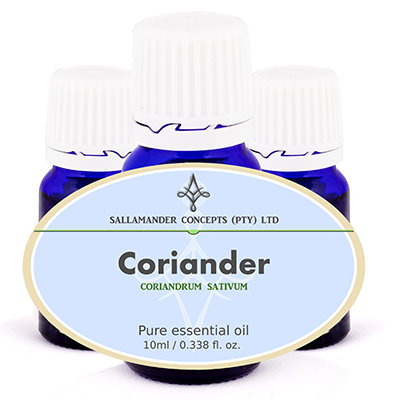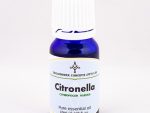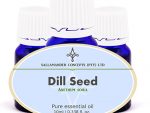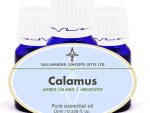Coriander Essential Oil
The Essential Oil from this ancient herb Coriander essential oil is extracted from Coriandrum sativum of the Umbelliferae (Apiaceae) family and is also known as coriander seed, Chinese parsley, Cilantro, Dhania and Dhaniya – some confusion over the seeds being called Coriander and the leaves being called Cilantro or Dhania/Dhaniya is also evident, as the seeds are known as Coriander seeds in the USA.
Coriander Essential Oil has a place in aromatherapy as it helps to ease the mind and fight fatigue, while it warms and calms the digestive system, relieves rheumatism and arthritic pain, muscular spasms and detoxifies the body.
Oil Properties
Coriander essential oil has a sweet, spicy, warm smell, is nearly colorless to pale yellow and has a watery viscosity.
Origin
The annual or biennial plant is a native of Morocco and grows to about 1 meter in height. It has sparse, fine, feathery leaves and pinkish/white flowers, which are followed by green seeds. The leaves (commonly called Cilantro in the USa and , when crushed, give off an unpleasant odor like squashed bugs. The Greek name ‘Koris’ (for bug) is the root word for Coriander. The seeds have been used for thousands of years by the Egyptians, as an aphrodisiac (with seeds even found in the tomb of Tutankhamen) and by the Romans and Greeks to flavor their wines, while the Indians use it in their cooking. The Carmelite order in France used the seeds to flavor their 17th century toilet water. It is still used in Chartreuse and Benedictine liqueurs.
Extraction
Coriander oil is extracted from the crushed ripe seeds by steam distillation and yields 0.8 – 1.0 % oil.
Chemical composition
Some of the main chemical components are Linalool, α-Pinene, γ-Terpinene, β-Pinene, ρ- Cymene and Camphor
Therapeutic properties
The therapeutic properties of coriander oil are analgesic, aphrodisiac, antispasmodic, carminative, depurative, deodorant, digestive, carminative, fungicidal, lipolytic, stimulant and stomachic.
Precautions
No contra-indications or dangers can be found in reports, but the oil can have a stupefying effect when used in very large doses or dilutions.
Please read our page with heading: Safety with Essential Oils before using this oil.
We recommend the following book as an excellent resource regarding safety:
Essential Oil Safety: A Guide for Health Care Professionals by Robert Tisserand & Rodney Young (#ad)
Uses
Coriander essential oil can be useful to refresh and to uplift the mind. It can help for mental fatigue, migraine, tension and nervous weakness. It has a warming effect on the stomach and relieves wind and cramps, while revitalizing the glandular system. It is helpful for alleviating rheumatism and arthritis pain, as well as muscle spasms and is useful with colds and flu. It also reported to act as a general cleanser of the body, to rid it of toxins and fluid wastes
Burners and vaporizers
In vapor therapy, coriander oil can stimulate the mind and ease fatigue, while assisting with eating disorders and improving appetite.
Blended Massage Oil or in the Bath
Coriander oil can help assist the digestive system, ease rheumatism and arthritis pain and muscular spasm, while detoxifying the body.
Blended in a Cream
As part of a cream or lotion, coriander oil can help with tension, mental fatigue, migraine, muscle spasms, arthritis and rheumatism pains and digestive problems, but should be used with care, as it may irritate some individual’s skin.
Suggested Dilution Rates
On the skin
Adult:
Face: 0.5% to 1.5%
Body: 1.5% to 3%
Bath: 1.5% to 4%
3 to 24 months:
Face: Avoid
Body: Maximum of 0.5%
Bath: Maximum of 0.5%
2 to 6 years:
Face: 0.5% to 1.5%
Body: 0.5% to 2%
Bath: 1% to 2%
6 to 15 years
Face: 1% to 1.5%
Body: 1.5% to 3%
Bath: 1% to 3%
Pregnancy
Face: 0.5% to 1.5%
Body: 0.5% to 2%
Bath: 1% to 2%
- When in doubt consult your doctor / medical professional before use.
- Most professionals and/or Aromatherapists will always err on the side of safety when giving advice regarding the use of essential oils and oleo resins during pregnancy.
- Quite a number of Aromatherapists advise that you should avoid essential oils completely while pregnant, specifically during the first trimester. This is a very safe approach but may not be necessary at all.
Diffusers and Vaporisers
4 to 8 drops
General:
- When using for the first time – Always use the lowest dilution rate and build up slowly to the maximum. Stop using all essential oils on the skin if irritation or allergy occurs.
- Any advice or instruction received from a medical professional ALWAYS supersedes recommendations or advice found on this website. When in doubt consult your doctor / medical professional.
Blends
Although most essential oils blend well together, coriander oil blends particularly well with Bergamot, Cinnamon, Ginger, Grapefruit, Lemon, Neroli and Orange.





